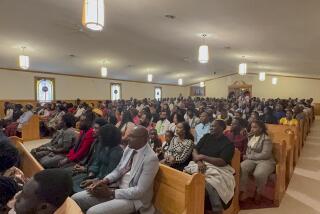Uprising of Haitian Hopes : Refugees: Exiles in L.A. anxiously await developments. For most, a return of Aristide would pave the way for their own homecomings.
Dieumaitre Joachim once was beaten for a song.
The 32-year-old singer, who remembers being roughed up and locked in a Haitian jail for performing at the inauguration of exiled President Jean-Bertrand Aristide, now follows events in Haiti from a continent away--in an apartment in Inglewood.
For the first time since fleeing his homeland in 1993, Joachim now dares to hope that he might be reunited with the family he left there, thanks to President Clinton’s announcement that he will use military force if necessary to remove the nation’s dictators from power.
“Today I’m so happy, I’m so happy for the invasion,” an animated Joachim said Friday, a day after watching Clinton’s televised speech explaining the planned action. “If Aristide goes back to Haiti, I can go back to Haiti.”
Joachim is one of about 1,000 Haitian refugees in Los Angeles, most of whom were placed here by immigration officials in the aftermath of the 1991 coup. At an Inglewood apartment house where about a dozen of them gathered Friday, the Haitians talked excitedly in Creole and English about what an invasion might mean for them.
For most, the prospect of an invasion represents the possibility of a long-held dream--to return home, to learn the fate of their families and to make a new start in a place that they used to call “le paradis,” the paradise.
*
“Yes, it is worth it,” Gurges Valere, 43, said of the risks that would accompany a military action. Valere, a former tour guide in Haiti, fled from the Jean Claude Duvalier dictatorship in 1979 and returned to Haiti the day of the coup against Aristide, only to have to flee again.
Haiti “has been so miserable for so long,” he said. “This has been a dream for Haitians for so long. This is the time. This is the time to go!”
At their sparsely furnished two- and three-bedroom apartments, some Haitians clasped photographs of the families they left, not knowing today if they are alive or dead. Some worried about relatives in the detention camps at Guantanamo Bay and about how an invasion might endanger their loved ones.
“We all have parents back there,” said Jerry Gaspard, executive director of the Crenshaw-based Haitian Refugee Center. “When the bombs are falling and the bullets flying, nobody’s safe.”
While the refugees voiced support for returning Aristide to power, some balked at what it may take--bloodshed.
“I want a solution. I don’t want to attack,” said Alfred Nozil, a soft-spoken, sad-faced Inglewood resident who fled Haiti in 1992 and thinks strongman Raoul Cedras will back out at the last minute. “I’ve seen enough people die.”
All of the refugees who gathered Friday said they left because they were terrified of remaining in a country where they could be shot for walking the streets at night, where women and children are murdered and where the authorities track and torture those who are identified as supporters of the democratically elected Aristide.
Joachim said he was jailed for supporting Aristide after a videotape of the inauguration came to the attention of the new military regime.
“All Haitians love Aristide,” the refugees agreed, dismissing rumors about the Catholic priest’s mental instability as falsehoods spread by the current dictatorship.
*
Several of the Haitians are college-educated, but said they are willing and, indeed, eager to work even minimum-wage jobs to get by in the United States. While there is no central gathering place for the community outside certain churches, such as Inglewood’s Church of God, the Haitians say they remain in touch with one another from Pasadena to Van Nuys, watching TV to follow the fate of their homeland and avidly discussing the latest developments.
“We are hard-working people,” said Alain Beliard, a medical worker who is doing secretarial work to make ends meet. “We’re proud of ourselves. All we ask of the American people is to show us the way,” he added, saying he would return to his home country to give medical assistance if needed. “Give us the tools and we’ll do the work.”
Valere and others said Clinton, whom they praised, should not need congressional approval for an invasion, noting that presidents Reagan and Bush did not seek congressional authorization for their invasions of Grenada and Panama.
The Haitians were also bitter when thinking back on the United States’ previous military action, the Gulf War.
“You give the oil more importance than human life?” asked Beliard, who proudly said he is a U.S. citizen, but added that his heart remains in Haiti. “Because we are black they don’t give a damn!”
Heads nodded in agreement.
Most did not think an invasion would be too costly, saying that the Haitian military is tired, outgunned and eager to give up.
“I don’t think the Haitian people are strong enough to fight with the U.S.,” said Elizette Cadet, 30, whose mother was slashed to death by a machete-wielding Haitian police officer. “They’ll give up,” she said of the military government, as her nephew Jhon Gerby ran in circles on the carpeted floor, waving a plastic gun.
“Who’ll fight? They’ll be so happy they’ll drop their weapons,” Jean Baptiste Renel, 35, said of the Haitian citizens.
The refugees all expected to be watching TV incessantly in the next few days to feed their hunger for information on the future of their homeland. “They want to go back to their country,” Beliard said. “Where you are born, that’s where you’re soul is at. You never forget that.”
More to Read
Sign up for Essential California
The most important California stories and recommendations in your inbox every morning.
You may occasionally receive promotional content from the Los Angeles Times.










